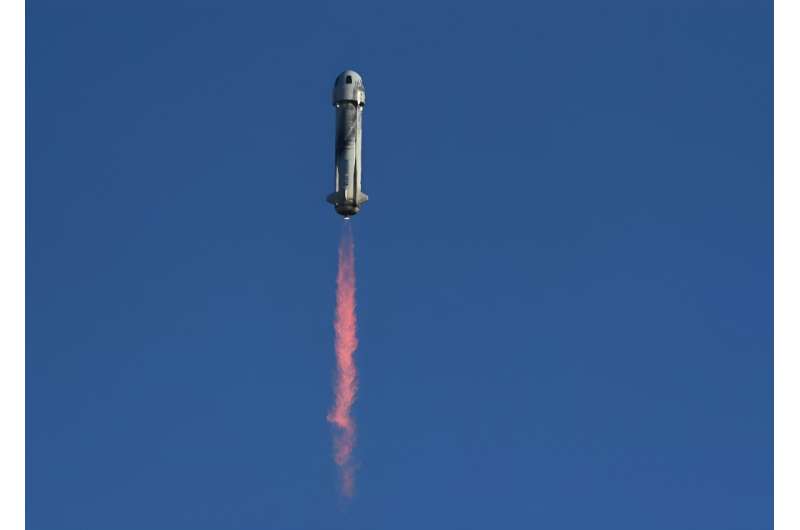This article has been reviewed according to Science X's editorial process and policies. Editors have highlighted the following attributes while ensuring the content's credibility:
fact-checked
reputable news agency
proofread
Jeff Bezos's Blue Origin heads back to space in critical launch

Blue Origin is set Monday to launch its New Shepard rocket for the first time since an uncrewed crash more than a year ago, a mission that is critical in reviving the fortunes of Jeff Bezos' space company.
Cold weather at the launch site near Van Horn, Texas, pushed back the takeoff window, which now starts at 9:30 am local time (15H30 GMT), Blue Origin said on X, formerly Twitter.
Though the rocket will carry a payload of science experiments, not people, mission NS-24 must succeed before Blue Origin can return to taking wealthy thrill-seekers to the final frontier.
On September 12, 2022, a Blue Origin rocket became engulfed in flames shortly after launch. The capsule, fixed to the top of the rocket, successfully initiated an emergency separation sequence and floated safely to the ground on parachutes.
The accident prompted a year-long probe by the Federal Aviation Administration (FAA), which found it was caused by the failure of an engine nozzle that experienced higher-than-expected engine operating temperatures.
The regulator issued a set of corrective actions Blue Origin had to undertake before it could resume flying, including the redesign of certain engine parts.
The FAA confirmed Sunday it had approved Blue Origin's application to fly again.
In all, Blue Origin has flown six crewed flights—some passengers were paying customers and others flew as guests—since July 2021, when Bezos himself took part in the first flight.
While Blue Origin has been grounded, rival Virgin Galactic, the company founded by British billionaire Richard Branson, has pressed on, flying five commercial flights this year.
The two companies compete in the emerging space tourism sector, offering a few minutes of weightlessness in "suborbital" space.
While Blue Origin launches a small rocket vertically, Virgin Galactic uses a large carrier plane to gain altitude and then drop off a smaller rocket-powered spaceplane that completes the journey to space.
In both cases, passengers enjoy a few minutes of weightlessness and can view the curvature of the Earth through large windows.
Virgin Galactic tickets were sold for between $200,000-$450,000, while Blue Origin doesn't disclose its ticket prices publicly.
Blue Origin is also developing a heavy rocket called New Glenn, with the maiden flight planned for next year.
This rocket, which measures 98 meters (320 feet) high, is designed to take a payload of as much as 45 metric tons into low Earth orbit.
© 2023 AFP



















